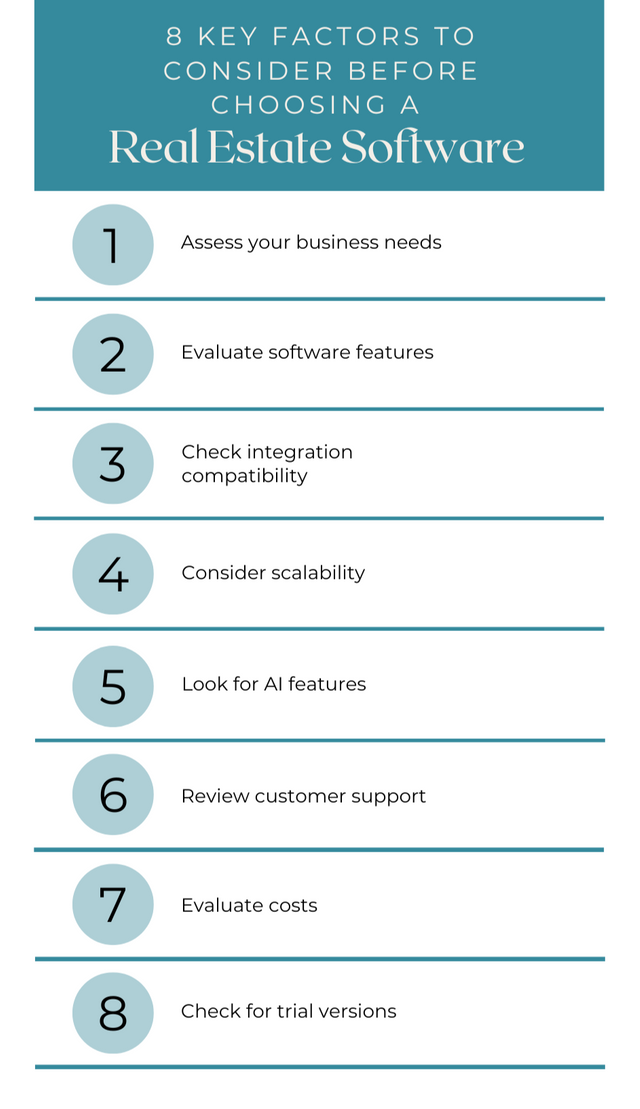An Ultimate Guide to Choosing the Right Real Estate Software in the UAE
Real estate software has revolutionized the industry by offering effective tools, insights, functional strategies and innovative features, especially in the UAE. Professionals and businesses who have been leading UAE’s property market could fall behind if they fail to adapt to the emerging technologies in this sector. However, those ready to incorporate real estate software can experience consistent development and sustainable success.
As per Grand View Research, the real estate software growth in UAE is expected to yield a projected value of $173.7 million by 2030, with a CAGR (Compound Annual Growth Rate) of 15.3%. In a competitive market like the UAE, strong real estate software will keep you at a better pace and help you face emerging challenges in the market and experience more growth.
So, we’ll break down the essential aspects of choosing the right real estate growth software for Dubai that can drive success in the UAE’s competitive market.
The 8 best tips to choose a real estate software
Here are 8 tips to consider while choosing real estate software for your business.
1. Assess your business needs
When looking for real estate software, it is key to completely assess your current operation requirements in the first place to identify areas that need improvement. Here are some important areas to focus on:
Are you focusing on lead generation and nurturing?
Do you need a CRM to build better client relationships?
Whether you need transaction management features for streamlined processes?
Are marketing automation solutions and strategies a top priority for you?
Understanding the specific needs of your business will help you choose a software solution that enhances performance in those areas. For example, if CRM is a key requirement, reviewing a real estate CRM solution designed for businesses in Dubai can offer insight into features that support client engagement, lead management, and workflow efficiency.
2. Evaluate software features
After identifying your business needs, look for features in the software that exactly fit your business goals. This helps avoid confusion and narrows down your choices to select real estate management software that addresses your business challenges.
Important features to look for in real estate software are as follows:
CRM (Customer Relationship Management): To manage, nurture and convert leads and clients efficiently
Automated marketing: To perform marketing via email campaigns, SMS and social media integration
Property management: To recommend properties, tenant screening, property tours, track leases, etc.
Transaction management: To process payments, sign digital contracts and e-signatures
Analytics and reporting: To acquire market, sales, lead conversion and financial performance insights
3. Check integration compatibility
Integration with different platforms boosts efficiency and helps manage operations in a single space. Major integrations for real estate businesses are:
MLS (Multiple Listing Service) for property listing
Accounting software for financial tracking
Marketing platforms for outreaching on social media, email, etc.
Cloud storage features for data and document management
Integrating essential platforms streamlines operations, reducing the need to manage each platform separately and improving workflow efficiency.
4. Consider scalability
Scalable software is highly instrumental for real estate businesses. Before choosing a software, ensure that it has the below features:
Should be able to handle increasing number of clients and property listings
Should offer advanced features or upgrades to support your business growth
Must be adaptable to multiple usage without any performance issues
5. Look for AI features
An AI-driven real estate growth platform can provide smarter and more efficient operations. Key AI-supported features for property businesses include:
AI chatbots for resolving client inquiries
Strong and predictive analytics features to forecast market trends
Automated lead scoring to spontaneously prioritize high-value leads
Smart property recommendations to match client preferences effectively
6. Review customer support
Customer support is needed to assist you and your clients in troubleshooting issues. Before choosing software, ensure they provide the following services:
Support channel feature like live chat, email or call support
Training resources like tutorials, FAQs or webinars
Good customer support ensures a smooth onboarding experience and reduces disruptions.
7. Evaluate cost
Real estate software pricing differs based on features and access to its users. Focusing on the factors below helps you evaluate the pricing and select the best solution for your business:
Subscription costs: Is it a one-time purchase or an annual or monthly subscription fee?
Hidden charges: Do they charge extra cost for training, integrations or add-on features?
ROI (Return on Investment): Whether the software’s efficiency justifies its price.
Compare different plans and choose one that fits your budget.
8. Check for trial versions
Most software providers offer free trial versions. Perform and test the below features while using the software:
Test the user interface
Assess the performance and speed
Use and determine whether it meets your specific business requirements
Additional considerations before you decide
Beyond the core aspects we have seen above, here are a few considerations to enhance your choices.
Review security features
Real estate business transactions involve sensitive client and financial information. Ensure that the software offers the below features:
Data encryption to protect information
Access controls to prevent unauthorized access from foreign users
Regular backups to safeguard against data loss
Security should be a top priority to avoid data breaches and legal issues.
Read testimonials and reviews
Before deciding on software for your business, check reviews and testimonials online from other real estate professionals for valuable insights into its trustworthiness. Don't miss out on checking these:
Feedback and overall user satisfaction
Common or frequent issues experienced by users
Conclusion
Selecting the right real estate software requires a careful evaluation of your business needs, with thorough research of available options and detailed analysis of features. By following the above steps, you can choose a solution that improves your operational efficiency, supports your business growth, maximizes profitability and sustains your business in the competitive real estate market.

